How Do I Know if I Need a Hearing Test?
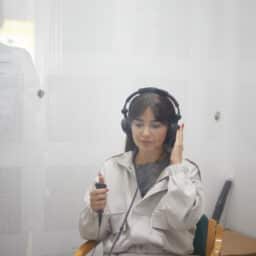
Hearing loss is common, with 15% of Americans reporting some trouble hearing. It can be subtle and gradual, making it difficult to notice at first. Often, people become more aware of hearing loss when family members tell them they should get their hearing checked. Paying attention to the early signs can help you act before…
Navigating the Emotional Journey of Hearing Loss

Approximately 15% of U.S. adults have hearing loss. If you or a loved one is processing a new hearing loss diagnosis, it’s helpful to recognize the five common emotional stages people go through on their journey to acceptance and treatment. Let’s take a look at these five stages and how you can manage them. 1….
How Does Stress Impact My Tinnitus?

Tinnitus is the presence of a sound in the ears that has no external source. Although the type of sound may differ from person to person, it’s usually described as a ringing or buzzing. Not a condition itself, tinnitus is a symptom of other medical conditions, including but not limited to age and noise-related hearing…
Tips To Get the Most Out of Your Hearing Aids This Holiday Season

Holiday parties are a fun way to relax at the end of the year. Whether you’re attending a huge holiday work party or joining friends for a few celebratory drinks at Steddy’s, you might be wondering how you can best manage your hearing loss for easier communication. Let’s take a look at a few ways…
Thriving at Thanksgiving: Communication Tips for Everyone

The air is crisp, the leaves are falling and Thanksgiving is right around the corner. It’s a time for gathering, gratitude and a lot of conversation. These lively gatherings can sometimes feel more exhausting than fun for those navigating hearing loss, but they don’t need to. With a few simple communication strategies, you can embrace…
How To Address Hearing Aid Non-Use
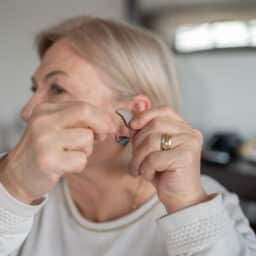
Approximately 28.8 million U.S. adults could benefit from hearing aids. These small but powerful devices pick up and amplify essential speech and background noise to keep the wearer alert and ease communication stress. With all their benefits, it may surprise you to learn that only 16% of people aged 20 to 69 who need hearing…
How Does Inner Ear Damage Affect Hearing?
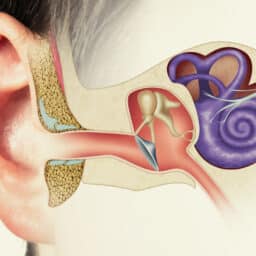
The auditory system is a complex structure working tirelessly to bring sounds like chirping birds or steaming milk at Southern Fuel Coffee to your brain. When one part of the system breaks down, hearing loss can arise. Let’s look at the inner ear’s anatomy and how damage inside it can lead to hearing loss. The…
How Does Diabetes Affect Your Hearing?
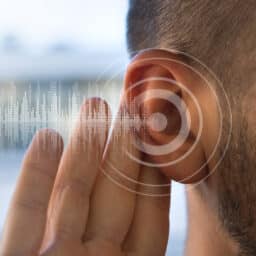
Diabetes, a chronic condition affecting blood sugar processing, can impact various bodily systems, including hearing, when not properly managed. Learn about the connection between the two here. The Connection Between Diabetes and Hearing Loss The inner ear’s blood vessels are particularly sensitive to blood flow. Diabetes-induced poor circulation and high blood sugar levels can inflict…
Is My Hearing Loss Temporary or Permanent?
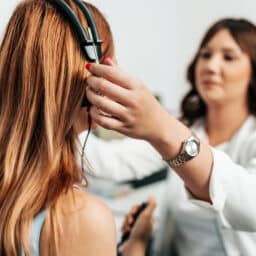
Nearly everyone has experienced muffled hearing at least once in their life. When this muffled hearing is temporary, it is not always a cause for concern. However, some instances of muffled hearing are permanent—known as permanent hearing loss. Knowing how to differentiate between temporary and permanent hearing loss is essential in ensuring you’re on the…
How to Combat Listening Fatigue: Tips for People with Hearing Loss

Listening fatigue, also known as ‘auditory fatigue’ or ‘mental fatigue,’ results from ongoing strenuous efforts to listen with hearing loss. For individuals with hearing loss, the brain has to work much harder to process sounds and speech, especially in the presence of distracting background noise. The constant strain of understanding those around you leads to…
Causes and Symptom Management of Somatic Tinnitus

Tinnitus is the perception of sound, usually a ringing or buzzing noise, without an external source or stimulus. Tinnitus affects approximately 10%-17% of the global population, and somatic tinnitus accounts for an estimated 65% of those cases. The somatosensory system is responsible for perceiving touch pressure, pain and temperature. It serves three primary functions: perception…
Tools to Improve Your Life With Tinnitus

Tinnitus causes a ringing or buzzing in the ears that cannot be heard from the outside. Affecting more than 50 million people in the United States, severe tinnitus can cause stress and anxiety, negatively impact your sleep and take a toll on your relationships. Tinnitus can be caused by loud noise exposure, ototoxic medication (medication…
Can Sound Enrichment Therapy Help Manage Your Tinnitus?
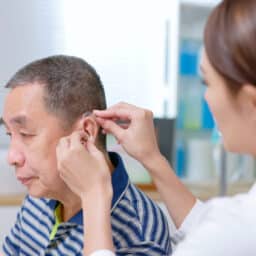
Tinnitus is a ringing, buzzing, roaring or clicking noise in the ears that cannot be heard from the outside. Affecting approximately 10% of the U.S. population, tinnitus can range from mildly bothersome to severe. Severe cases can interrupt your sleep and cause headaches, irritability and stress. While there is no known cure for tinnitus, several…
Effects of Untreated Hearing Loss on Senior Citizens
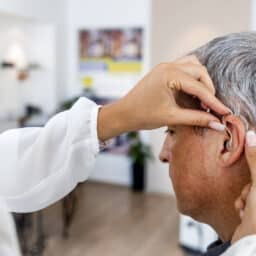
According to the National Institute on Aging, approximately one in three people ages 65 to 74 has hearing loss. For those ages 75 and up, this number jumps to one in two. But because hearing loss is a progressive condition, many people at Senior Action aren’t even aware they have it until it has progressed…
Learn About the History of the Hearing Aid for Audiology Awareness Month

Hearing aids make life for people with hearing loss so much easier. Whether they help you follow along during work meetings or to connect with your grandchildren over a stack of waffles at Jimmy’s Family Restaurant, hearing aids make it possible to hear the sounds that matter most. This Audiology Awareness Month, we wanted to…
How to Support a Loved One with Hearing Loss Who’s in a Nursing Home

The most common cause of hearing loss is old age, usually due to a lifetime of noise exposure. In fact, according to one study, “It is estimated that 70% to 90% of elderly residents in long-term care facilities have some degree of hearing impairment.” Many of these residents with hearing loss wear hearing aids to…
Can Hearing Aids Help My Mind?
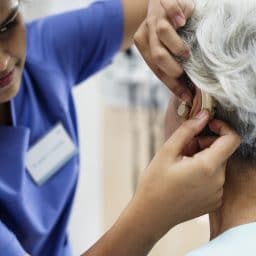
Hearing aids don’t just allow you to hear better, they improve your quality of life. Whether that means getting to enjoy an engaging conversation with friends out at dinner or going to your granddaughter’s piano recital at the Fine Arts Center of Easley, these are activities that keep you connected to your community and benefit…
May is Better Speech and Hearing Month!
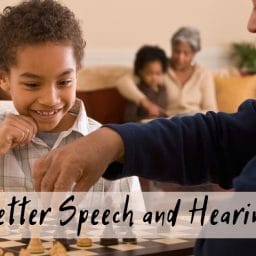
Each May, Better Hearing & Speech Month (BHSM) is an annual event promoted by the American Speech-Language-Hearing Association (ASHA) to raise awareness about communication disorders. For 2019, their theme is “Communication Across the Lifespan.”. We hope this inspiring story of the local rising baseball star Danton Hyman will inspire you to take care of your…
Tips for Adjusting to a New Pair of Hearing Aids
If you’ve just been fitted for a new pair of hearing aids, congratulations! Whether you’ve just been diagnosed with a hearing loss or you have upgraded from an old pair of hearing aids, the use of hearing aids brings significant benefits to your life. As with all new, life-changing things, adjusting to a new pair…
